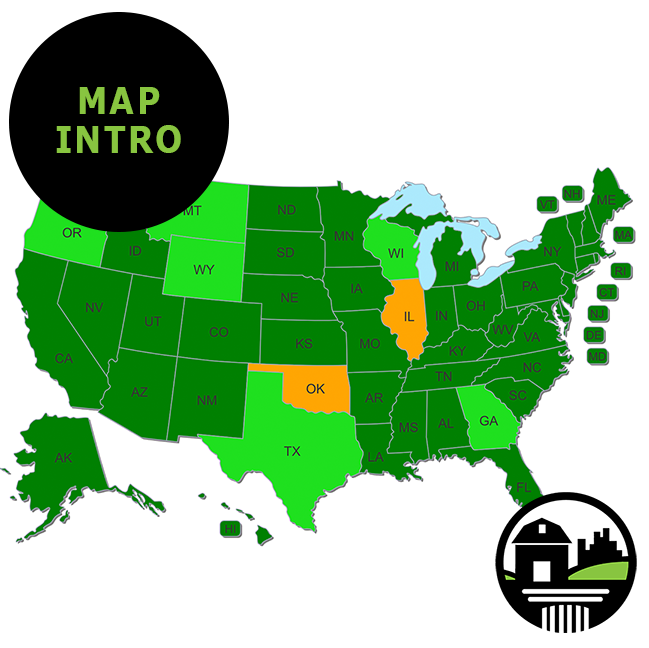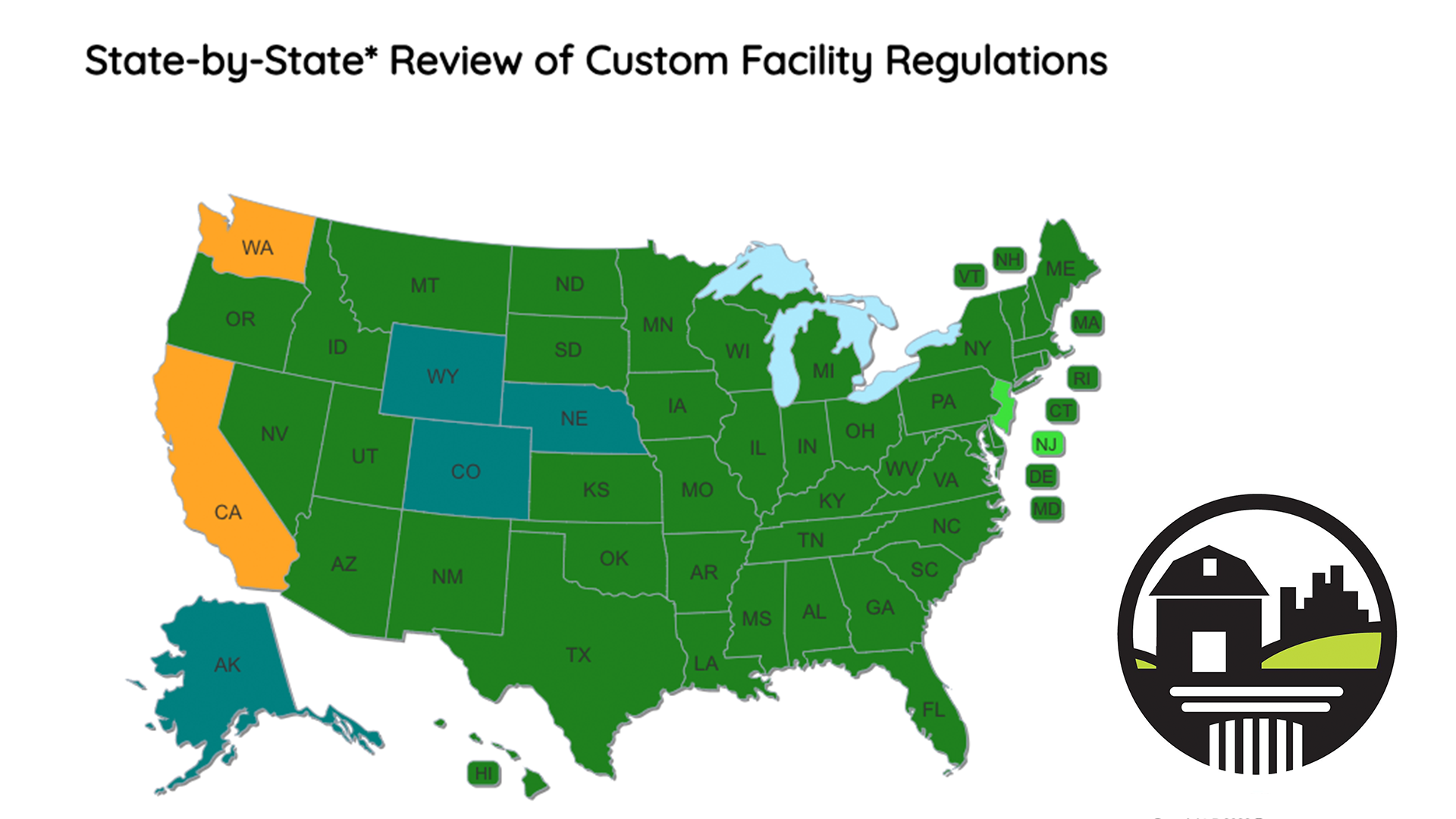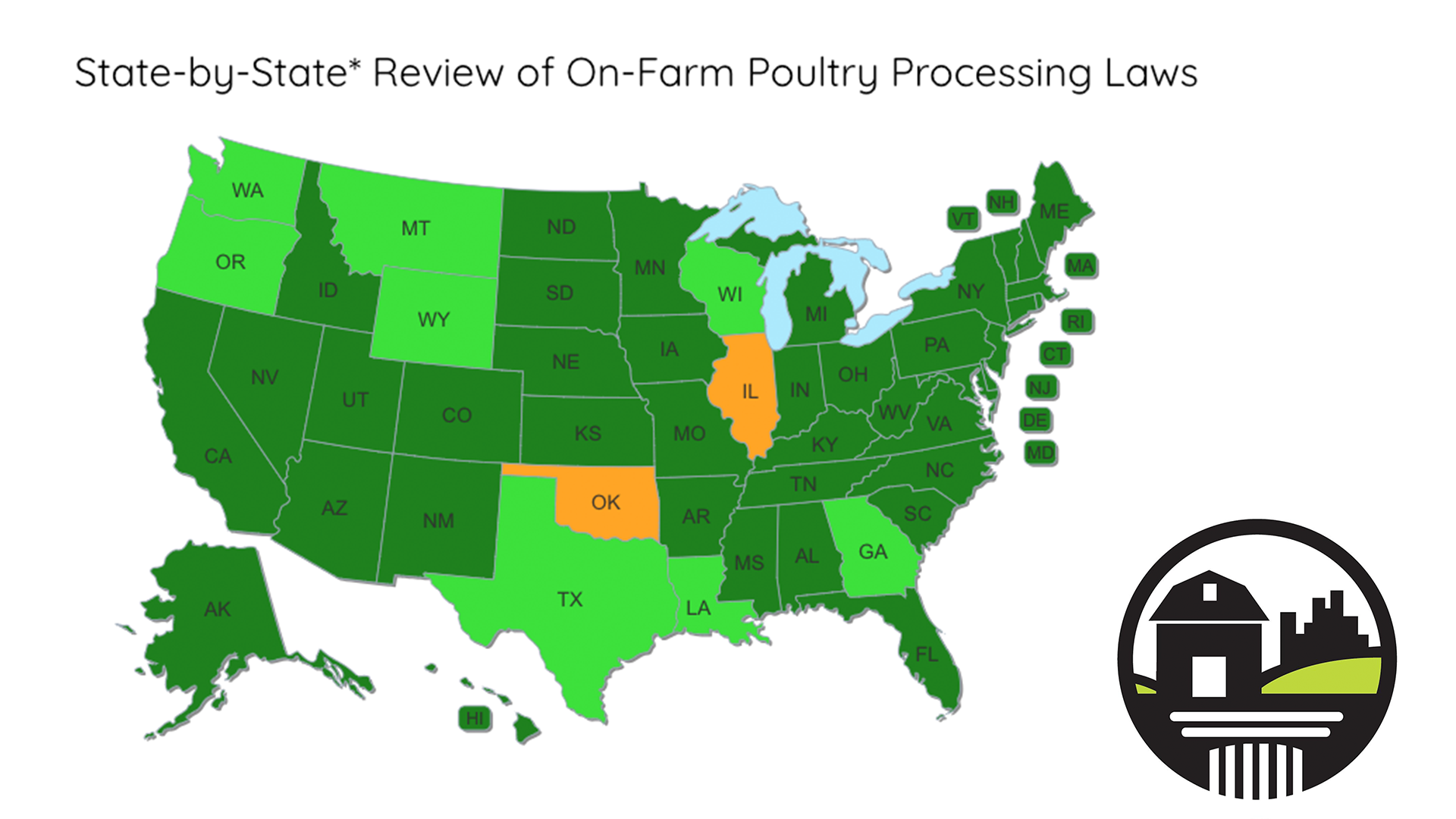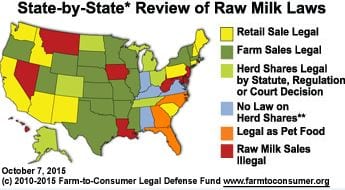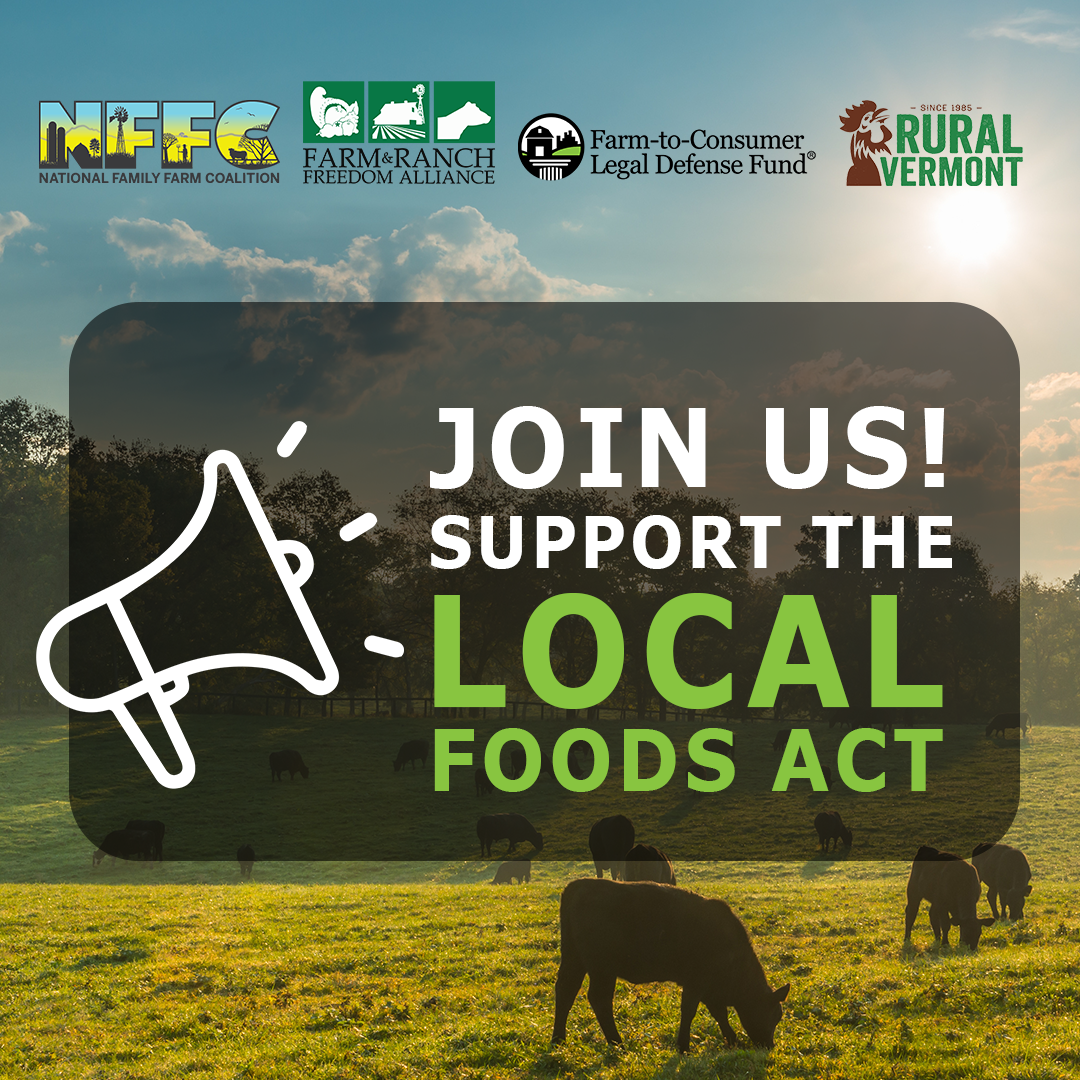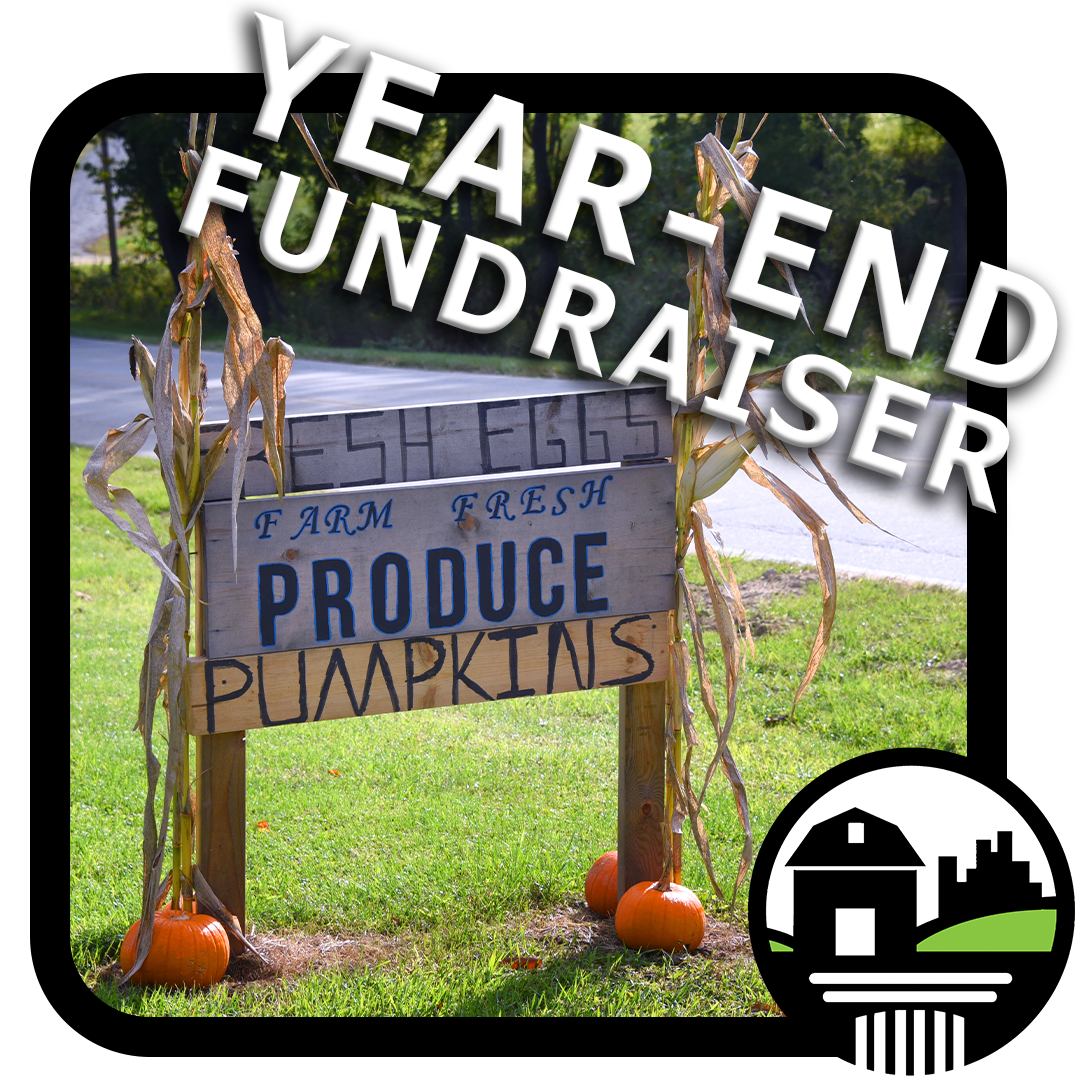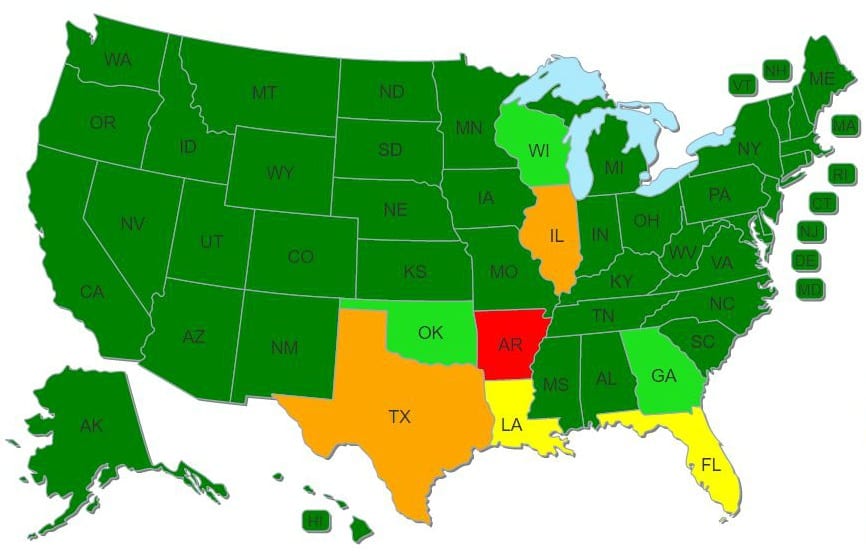 In 1968, Congress passed Public Law 90-492, amending the Poultry Products Inspection Act. The amendments created exemptions allowing for the sale of uninspected poultry that is slaughtered and processed on a farm, meaning an inspector does not have to be present when the slaughtering and processing is taking place. The exemptions are codified in 9 CFR 381.10.
In 1968, Congress passed Public Law 90-492, amending the Poultry Products Inspection Act. The amendments created exemptions allowing for the sale of uninspected poultry that is slaughtered and processed on a farm, meaning an inspector does not have to be present when the slaughtering and processing is taking place. The exemptions are codified in 9 CFR 381.10.
Of the exemptions created by Congress, the On-Farm Poultry Processing Map covers the two Producer/Grower categories: the 1,000-bird exemption and the 20,000-bird exemption. The term “Producer/Grower” refers to someone who raises poultry on his or her premises and then slaughters and processes the poultry for sale as human food.
According to a guidance document published by USDA’s Food Safety Inspection Service (FSIS) in 2006, Guidance for Determining Whether a Poultry Slaughter or Processing Operation is Exempt from Inspection Requirements of the Poultry Products Inspection Act (see pages 9-11), producers must meet specific criteria to qualify for the exemptions.
A Producer/Grower must meet the following criteria to be eligible for the 1,000-bird exemption:
- The producer slaughters no more than 1,000 healthy birds of his or her own raising in a calendar year for distribution as human food;
- The producer does not engage in buying or selling poultry products other than those produced from poultry raised on his or her own farm;
- The slaughter and processing are conducted under sanitary standards, practices, and procedures that produce poultry products that are not adulterated;
- The producer keeps records showing that he or she has in fact not distributed more than 1,000 birds for use as human food during a calendar year;
- The poultry products are distributed only in intrastate commerce.
A Producer/Grower must meet the following criteria to be eligible for the 20,000-bird exemption:
- The producer slaughters and processes, on his or her own premises, no more than 20,000 poultry, raised by him or her in a calendar year;
- The producer sells, in a calendar year, only poultry or poultry products that he or she prepares, according to criteria #1;
- The producer distributes the poultry products only in intrastate commerce;
- The poultry are healthy when slaughtered;
- The slaughter and processing at the producer’s premises are conducted using sanitary standards, practices, and procedures that produce poultry products that are not adulterated;
- The producer only distributes poultry products he or she produced under the Producer/Grower exemption;
- The facility used to slaughter or process the poultry is not used to slaughter or process another person’s poultry unless the administrator of FSIS grants an exemption; and
- The shipping containers, when distributed in intrastate commerce (instead of the required features of a label of inspected products), bear:
- The producer’s name,
- The producer’s address, and
- The statement, “Exempt P.L.90-492”.
States have the option of adopting the 1,000-bird exemption, the 20,000-bird exemption, both, or neither. As the map shows, the overwhelming majority of states have adopted both exemptions. Note that Illinois has adopted only its own 5,000 exemption. States also have the option of setting a lower maximum than 20,000 for their exemption.
Both FSIS and the states adopting any of the exemptions have jurisdiction over the producers processing poultry on the farm. States can adopt regulations that are stricter than the federal requirements, but any laws they adopt must be at least as strict as the federal standards. When it comes to sanitary standards for on-farm poultry processing, there is a division of opinion as to whether producers can process poultry in the open air. According to FSIS, open-air poultry slaughter is in compliance with federal requirements, but there are states adopting the exemption that require an enclosed facility. FTCLDF will be posting a more detailed description of on-farm poultry processing laws that will provide information on whether the state has adopted the federal standard regarding open-air poultry processing.
Federal law allows the sale of poultry by producers under either exemption direct to consumers, retail stores, hotels, restaurants, and institutions (“institutions” according to FSIS include schools, hospitals, and nursing homes). Many states have adopted laws with more limited venues; a number of states only allow sales direct to the consumer. FTCLDF will be providing a state-by-state breakdown in this area, as well.
The federal poultry processing exemption has been one of the better laws for local food producers that Congress has passed. All states should be taking full advantage of it.
REFERENCES
USDA-FSIS. Guidance for Determining Whether a Poultry Slaughter or Processing Operation is Exempt from Inspection Requirements of the Poultry Products Inspection Act. Revision 1, April 2006. Retrieved 7/31/2014 online from http://sustainagga.caes.uga.edu/documents/USDAPoultry_Slaughter_Exemption_0406.pdf Click here to view document
USDA-FSIS Policy Development Staff. On-farm Poultry Slaughter/Processing [Incident: 150730000107]. Response via AskFSIS July 31, 2015. File: Q–Hunter-USDA-FSIS-open-airPoultry-073115.pdf Click here to view document
USDA-FSIS Policy Development Staff. On-farm Poultry Sales to Institutions [Incident: 160927-000065]. Response via AskFSIS September 28, 2016. File: Q–Duryea-USDA-FSIS-OnFarmPoultrySales-Institutions-092816.pdf Click here to view document
YOUR FUND AT WORK
 Services provided by FTCLDF go beyond legal representation for members in court cases.
Services provided by FTCLDF go beyond legal representation for members in court cases.
Educational and policy work also provide an avenue for FTCLDF to build grassroots activism to create the most favorable regulatory climate possible. In addition to advising on bill language, FTCLDF supports favorable legislation via action alerts, social media outreach, and the online petition service.
You can help FTCLDF by becoming a member or donating today.

 Anyone wanting to make a contribution to support the work of FTCLDF can make a donation online or send a check to:
Anyone wanting to make a contribution to support the work of FTCLDF can make a donation online or send a check to:
FTCLDF
8116 Arlington Blvd, # 263
Falls Church, VA 22042
Prefer to make a tax-deductible donation? Donate online here.
You may also contact us by email at [email protected] or call 703-208-FARM (3276). Thanks for your support.
